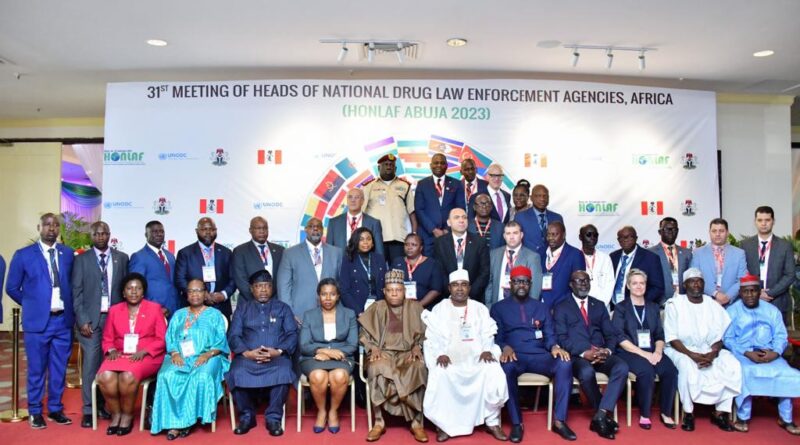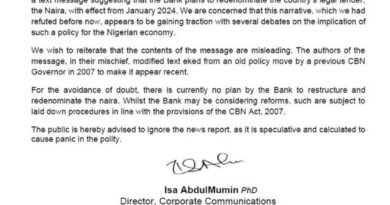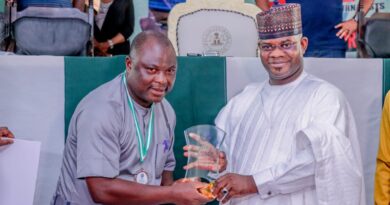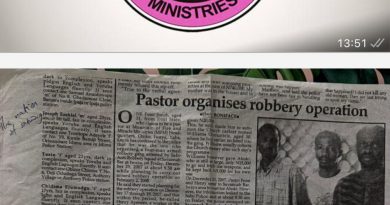Tinubu Expresses Commitment To Fight Against Illicit Drug
By Bukar Bolori
President Bola Tinubu has reiterated his administration’s commitment to the ongoing fight against substance abuse and illicit drug trafficking in the country, insisting that there is need for conceited efforts from all across the world to curtail the global drug problem.
The President also assured he would continue to provide necessary support and tools for the nation’s anti-narcotics agency, the National Drug Law Enforcement Agency, NDLEA to fulfil on its mandate.
Tinubu, gave the assurances on Tuesday while declaring open the 31st meeting of Heads of National Drug Law Enforcement Agencies, Africa (HONLAF) in Abuja.
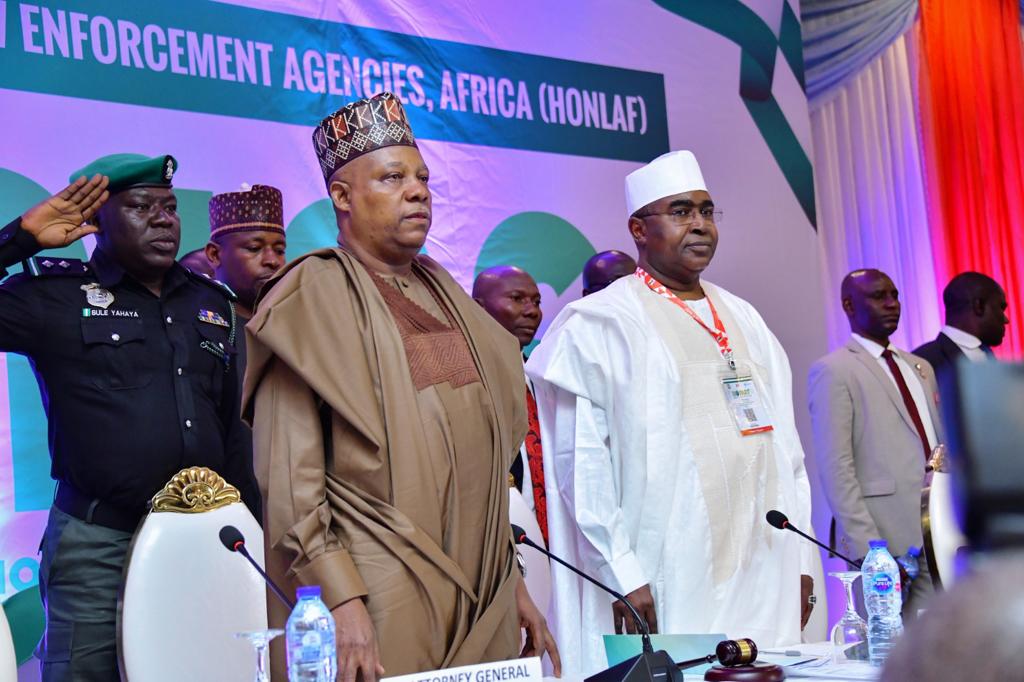
Represented by the Vice President, Senator Kashim Shettima, the President said: “This administration will continue to provide the necessary support, motivation, and tools for the NDLEA to fulfill its mandate.”
He said: “We understand the connection between the success of the fight against substance abuse and illicit drug trafficking and the attainment of a number of goals on our socio-economic and security agenda.
“For us, the commitment to the fight against drug trafficking and substance abuse is not just a matter of policy; it is a moral imperative. We recognize that a population at war with drugs is not a dividend but a liability. We believe that the future of our youth, the strength of our institutions, and the well-being of our communities depend on our ability to eradicate this threat.
“So, I must appeal to you to see this gathering as an avenue for the exchange of novel ideas and the development of practical strategies. We must consolidate established contacts, operational partnerships, and cooperation to ensure that the outcomes of this four-day deliberation advance public safety and the emergence of drug-free African communities.”
He noted that: “Our strength has always been our proactive actions to prevent any individual or group from turning our countries into a minefield of drug trafficking. So, we must prioritize prevention, education, and rehabilitation to empower our youth with knowledge and opportunities. We must steer them away from the treacherous path of drug abuse and trafficking and protect our economy from the consequences of their actions.”
The President while emphasising the threat posed to countries by drug scourge, urged participants attending the conference to seize the opportunity of the gathering to come up with novel strategies to dismantle drug cartels across the African continent.
He said: “We are at the mercy of a threat that knows neither race nor geography, neither gender nor social class. This threat has crossed borders and destroyed societies and dreams. Without the moral commitment of the men and women in this room, this threat would have left cities, countries, and even civilizations erased. So, I must commend you for your sacrifices in the bid to keep our world drug-free, sane and safe.”
He said the choice of Nigeria to host the conference and its drug czar to chair the meeting is a profound recognition of the campaign and fight against illicit drugs led by the National Drug Law Enforcement Agency (NDLEA).
“We are hosting the 31st HONLAF meeting here to reassure you of our promise to participate in building a world not threatened by the infiltration of illicit drugs. Over the decades, criminal organizations have attempted to breach our security measures in their business of polluting nations and minds. But while it’s a compliment that drug-law enforcement organisations are a threat to their criminal empires, their desperation must never be taken for granted,” he added.
The President stated that: “Without you as gatekeepers of healthy nations, humanity as we know it would have long been perverted. So, on behalf of the world, I say: thank you, thank you to all of you who have kept us from being polluted and destroyed.”
In his remarks, the Chairman/Chief Executive Officer of NDLEA, Brig. Gen. Buba Marwa (Retd) who was elected to chair the conference, while citing the details of the 2023 world drug report as a challenge for Africa, charged his counterparts across the continent to strengthen operational networks and raise the bar in the drug war.
He said: “Drug use disorders are harming health, including mental health, safety and well-being,” adding that the harms caused by drug trafficking and illicit drug use are enormous, insisting that they are also contributing to many of these threats, from instability and violence to environmental devastation.
He said: “Young people are using more drugs than previous generations, and the majority of people being treated for drug use disorders in Africa are under the age of 35. What is worse, the availability of treatment and other services has not kept pace with these developments, and women in particular are suffering from treatment gaps.
“The world drug problem, in all its forms and manifestations, affects all of us. The stakes are especially high for Africa. No one country can tackle a problem of this magnitude alone; just as well, the world drug problem cannot be tackled solely through international policymaking; it also requires effective implementation and collaboration among practitioners. This is where the HONLAF comes in. The meeting is very important, as it enables its parent body, the UN Commission on Narcotic Drugs, to learn about current regional drug trends, threats, and emerging challenges from practitioners and law enforcement experts, from all parts of the continent. “We need regional perspectives to enrich the global policy discussion, and HONLAF is the opportunity to bring the African perspective to the global level. The sessions provide a platform to share knowledge and practices and learn from each other.
“The 31st meeting will indeed provide an opportunity for us to raise the bar and break new ground in different areas of our operations and collaborative efforts. I am as excited as a lot of us in this hall are to make presentations, listen to others, and share experiences that will positively shape our operations and redefine our cooperation at the end of this conference.”
In his remarks at the ceremony, Attorney General of the Federation and Minister of Justice, Lateef Fagbemi, represented by the Director, International Criminal Justice Cooperation, Federal Ministry of Justice, Mrs. Nkiruka Jones-Nebo said “It is imperative that this conference remains proactive in addressing the legal complexities that may impede seamless cooperation in intelligence sharing, joint operations, and training. These barriers must be dismantled to prevent any loopholes that could potentially facilitate the activities of drug cartels operating across our borders.
“The Federal Ministry of Justice stands committed to providing unwavering support and efficient systems to empower NDLEA in its mission.”
The Country Representative of the United Nations Office on Drugs and Crime, (UNODC), Oliver Stolpe on his part, said the drug problem has changed from what it used to be 20 years ago, noting that: “Today, the picture is different, local consumption is increasing, and increasingly problematic. We need a balanced approach to supply and demand reduction. We need to invest in prevention and in treatment. And, we need alternatives to imprisonment for drug users that are more effective and help decongesting prisons. At the same time, we need to strengthen cooperation between countries along drug trafficking routes with the aim of dismantling the ever more sophisticated trafficking networks.”
The Executive Director, UNODC, Ghada Waly and the Chairman, UN Commission on Narcotic Drugs who both spoke via video messages expressed support for the gathering and charged delegates to maximise the opportunities provided by the platform.
One of the highpoints of the ceremony was the presentation of a report on Organised Crime in Nigeria: A Threat Assessment (NOCTA) produced by the National Institute for Security Studies in collaboration with security agencies and supported by the UNODC.
Speaking on the report, Commandant of NISS, Ayodele Adeleke said “With investigations to connect transit and production countries, the report is hoped to encourage other partnerships to create a coalition that fights organised crime in partnership and collaboration. We must not give up, let us give Nigeria the true future it deserves.”

